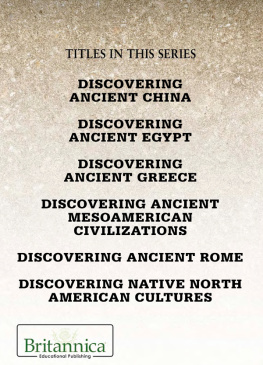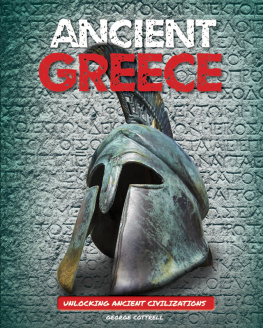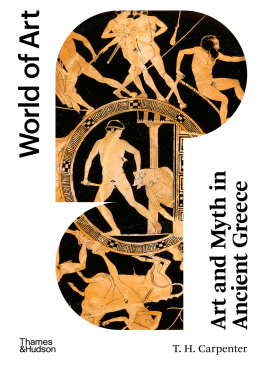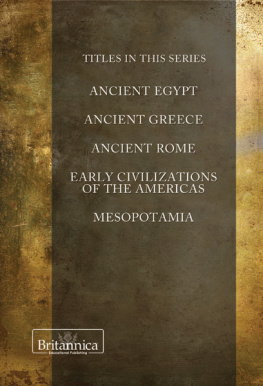

Published in 2015 by Britannica Educational Publishing (a trademark of Encyclopdia Britannica, Inc.) in association with The Rosen Publishing Group, Inc.
29 East 21st Street, New York, NY 10010
Copyright 2015 The Rosen Publishing Group, Inc., and Encyclopdia Britannica, Inc. Encyclopdia Britannica, Britannica, and the Thistle logo are registered trademarks of Encyclopdia Britannica, Inc. All rights reserved.
Distributed exclusively by Rosen Publishing.
To see additional Britannica Educational Publishing titles, go to rosenpublishing.com.
First Edition
Britannica Educational Publishing
J. E. Luebering: Director, Core Reference Group
Anthony L. Green: Editor, Comptons by Britannica
Rosen Publishing
Hope Lourie Killcoyne: Executive Editor
Jacob R. Steinberg: Editor
Nelson S: Art Director
Michael Moy: Designer
Cindy Reiman: Photography Manager
Library of CongressCataloging-in-Publication Data
Morgan, Kathryn, 1983
Discovering ancient Greece/Kathryn Morgan.
pages cm.(Exploring ancient civilizations)
Includes bibliographical references and index.
ISBN 978-1-6227-5833-3 (eBook)
1. GreeceCivilizationTo 146 B.C.Juvenile literature. I. Title.
DF77.M7585 2015
938dc23
2014024100
Cover, pp. 1, 3 Christian Delbert/Shutterstock.com; p. 7 North Wind Picture Archives/The Image Works; p. 9 Dorling Kindersley/Getty Images; pp. 10, 13 De Agostini/Getty Images; p. 11 akg-images/Peter Connolly/The Image Works; p. 16 V-DIA-Scala from Art Resource, NY; pp. 17, 40 Alinari/Art Resource, NY; p.19 Mondadori Portfolio/Hulton Fine Art Collection/Getty Images; p. 21 v0v/Fotolia; p. 24 Danita Delimont/Gallo Images/Getty Images; p. 26 Album/Prisma/SuperStock; p. 27 Hemis.fr/SuperStock; p. 29 Erich Lessing/Art Resource, NY; p. 30 Galleria degli Uffizi, Florence, Italy/Bridgeman Images; p. 32 Photos.com/Thinkstock; p. 33 Panagiotis Karapanagiotis/iStock/Thinkstock; pp. 35, 42 DEA/ G. Dagli Orti/De Agostini Picture Library/Getty Images; p. 36 The Bridgeman Art Library/Getty Images; pp. 3839 Scala/Art Resource, NY; cover and interior graphics Freckles/Shutterstock.com (patterned banners and borders, background textures), HorenkO/Shutterstock.com (background textures).
CONTENTS
M ore than three thousand years ago, the Greeks began to develop one of the most remarkable civilizations of the ancient world. In their own time, the ancient Greeks spread their influence far and wide by expanding their borders beyond the Greece we know today. They founded cities along the coasts of Africa, Turkey, Italy, and France, carrying their culture throughout the region. But their impact did not end there. Their achievements in politics, philosophy, science, and the arts formed a legacy that has had an unmatched influence on Western civilization to this day.
The ancient Greeks lived in self-governing communities called city-states. In the most famous of the city-states, Athens, they created the worlds first democracy. The word democracy comes from a Greek word meaning rule by the people. Democracy is still one of the most widely used political systems in the world.

As shown on this map, the boundaries of ancient Greeceand the extent of its influencewent beyond the borders of the modern country of Greece.
Though often separated by barriers of sea and mountain, the city-states were united by their common language, religion, and customs. They also shared a body of stories about their gods, heroes, and the nature of the universe. These stories, or myths, have influenced world literature and continue to be studied today. With such an interesting culture ready to be explored, let the discovery of ancient Greece begin!
L ike most cultures of the ancient world, Greece had a class system that grouped people into distinct social rankings. The hierarchy of privilege and authority placed naturally born Greeks, particularly men, at the top. Beneath them were residents who had relocated from other countries, called metics. They shared many of the obligations of native Greeks, but they were denied certain benefits of citizenship. The class of metics also included freed slaves. Slaves formed the lowest class. They possessed no rights and, like metics and freedmen, were not considered citizens.
The Only True Citizens: Greek Men
Because adult male citizens formed the upper class, they dominated public life in ancient Greece. In the city-states with a democratic form of government, only adult males could take part in politics. These men represented just a small portion of the population. In Athensthe best-known city-state and the birthplace of democracythey made up only 12 percent of the people.
Athenian men spent their time talking politics and philosophy in the agora, or marketplace. They exercised in the athletic fields, performed military duty, and took part in state festivals. Some took part in the Assembly, which made the city-states laws and policies. Despite their high social standing, even men were not allowed to publicly criticize their government or the gods.

This illustration shows the layout of the agora of Athens. In ancient Greek cities, the agora was an open space that served as a meeting ground for various activities of the citizens.
In the military, men were trained to think and act tactically. Athens developed a powerful navy and became a strong sea power. But the most powerful military city-state was Sparta, with its superior army. All male Spartan citizens between the ages of twenty and sixty served in the army.

A ceramic plate depicts a battle between Menelaus, king of Sparta, and the Trojan hero Hector. In the legendary conflict known as the Trojan War, the early Greeks defeated the people of Troy.
Life at Home: Women and Children
Women in ancient Greece spent their days at home. They spun, wove, and performed other household chores. The houses were made of sun-dried brick and stood on narrow, winding streets. There were usually several rooms surrounding a private courtyard. The rooms included separate apartments for men and women as well as tiny bedrooms.

Homes in ancient Greece were designed around a courtyard that provided a place for women to enjoy fresh air and for children to play. They also included separate living quarters for men and women.
The courtyard allowed women to enjoy the outdoors without leaving the home and also provided a place for the children to play. Children in ancient Greece had many of the same kinds of toys that children today play with. These included rattles, clay animals, horses pulled on a string, yo-yos, and dolls.
EDUCATION IN ANCIENT GREECE





![Michael Lovano - The World of Ancient Greece: A Daily Life Encyclopedia [2 Volumes]](/uploads/posts/book/268736/thumbs/michael-lovano-the-world-of-ancient-greece-a.jpg)









